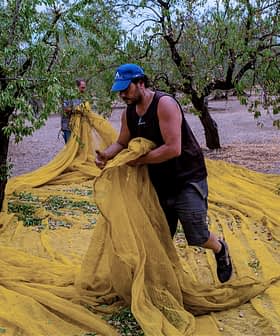Six Years With No Cure: The Continuing Consequences of Xylella
While the body of research on Xylella fastidiosa has expanded significantly since its discovery, so has the complexity of the disease. With no cure in sight, farmers must learn to adapt.
 Photo by Cain Burdeau for Olive Oil Times
Photo by Cain Burdeau for Olive Oil TimesSix years since it first appeared, with no cure in sight, olive producers throughout Europe are learning to live with the devastating consequences of Xylella fastidiosa.
Xylella fastidiosa (Xf), a plant bacteria the European Commission labels one of the most dangerous in the world, was initially spotted in the Apulia region in the south of Italy in 2013. Since then, evidence of its impact has been discovered in Spain, France, Portugal, and parts of the Middle East.
The effects of this disaster on the families and companies involved are absolutely devastating. Centuries of history, culture and traditions are destroyed.
A spokesperson from the European Food and Safety Authority (EFSA) said that, while the body of research on Xylella has expanded significantly since its discovery, so has the complexity of the disease, which has complicated the ongoing research efforts in pursuit of a cure.
See Also:Xylella fastidiosa NewsThe lack of a cure has made containment more important than ever, with EFSA simulations indicating that growers who discover signs of Xf must take immediate action.
“[It’s] essential that the emergency phytosanitary measures (including the cutting of plants and the vector control) are applied timely and effectively at the first detection of a new outbreak,” the spokesperson said. “If even just one of these elements is not applied in the correct manner it becomes very difficult to eradicate or contain the disease.”
While the EFSA has continued to review new studies, including some that offer promising results for resistant and tolerant plant cultivars, it does not appear a cure will emerge anytime soon, news that does little to encourage olive oil producers such as Giovanni Melcarne, whose family has been growing olives in the Italian province of Lecce for more than 500 years. He estimates Xylella has destroyed at least 80 percent of his farm.
“The effects of this disaster on the families and companies involved are absolutely devastating,” Melcarne said. “Centuries of history, culture and traditions are destroyed.”
While the Italian government has released some legislation mandating containment, for the most part, they have been met with criticism and distrust.
The government has also been condemned by farmers and, notably, the European Court of Justice for a lack of action, and a failure to stop the bacterium from advancing. In Lecce, Melcarne says he has seen little effective governmental action.
“Policy has been blind and sluggish, unable to foresee adequate measures to contain the spread of the bacteria,” Melcarne said. “Olive farmers and millers are left alone in this disaster.”
As the government wrestles with how best to stem the crisis, growers are desperately trying to minimize their economic losses. Some are working to plant new olive trees, despite the bureaucratic hurdles they may face. Others, including Melcarne, are adapting more imaginative solutions, such as developing new products and renting out farmhouses to visiting tourists.
As Xylella begins to settle in as the new reality, Melcarne remains certain that change will only come if growers learn to adapt the methods proposed by the latest research, such as the resistant cultivars described by the EFSA. Without that, he said, there is little hope for the region.
“A people that is against science does not have any future,” Melcarne said.








